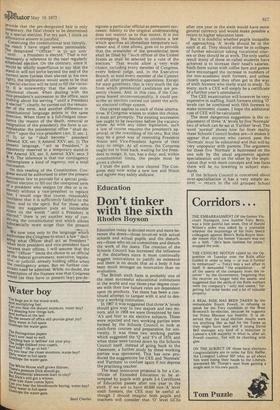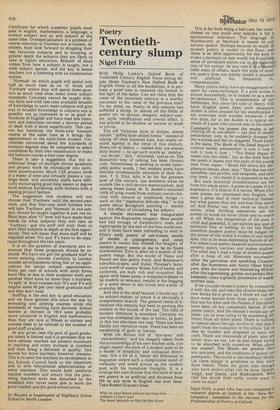Education
Don't tinker
with the sixth
Rhodes Boyson
Education today is divided more and more between the doers—those involved with actual schools and actual pupils, and the disturbers—those who sit on committees and disturb the work of the doers. The creation of the Schools Council has increased the influence of the disturbers since it must continually suggest innovations to justify its existence and there is no doubt that as a body it has been much stronger on innovation than on evaluation.
The British sixth form is probably one of the most successful educational institutions in the world and our three-year degree courses with their low failure rates are dependent upon its products. Yet there has been a continued attempt to tamper with it and to destroy a working institution.
In 1967 it was suggested that three'A' levels should give way to two majors and two minors, and in 1968 we were threatened by two 'A's and four to six elective subjects. These were rejected and two working parties were formed by the Schools Council to look at sixth-form courses and preparation for university. It was these two working parties which suggested the 'Q' and 'F's of 1970, and when these were turned down by the Schools Council itself, instead of going back to the classroom, a further ,study by these working parties was sponsored. This has now produced the suggestions for CEE and 'Normals' and 'Furthers' to confuse again if not depress the practising teacher.
The least innocuous proposal is for a Certificate of Extended Education to be attempted by pupils with grade 2-4 Certificate of Education passes after one year in the sixth. If we are to have 40,000 non-'A' level sixth formers, the CEE may be useful although I should imagine both pupils and teachers will consider that '0' level GCEs after one year in the sixth would have more general currency and would make possible a return to higher education later.
But it is doubtful whether pupils incapable of approaching 'A' levels should be in the sixth at all. They should either be in colleges of further education taking vocational courses or they should be at work. The only useful result many of these so-called students have achieved is to increase their head's salaries. Sixth-form suites with coffee bars and games have encouraged the increase in numbers of the non-academic sixth formers, and unless closely supervised they often get in the way of sixth formers who really want to study. To many, such a CEE will simply be a certificate of a further year's attendance.
The CEE examination will however be very expensive in staffing. Sixth formers sitting '0' levels can be combined with fifth formers to make economic classes. I hope the additional cost of CEE will be calculated.
The most dangerous suggestion is the replacement of three 'A' levels by five 'Normals' two of which can be sat at 'Further' level. The word 'normal' shows how far from reality these Schools Council bodies are—it makes it appear that anyone who cannot pass the 'Normals' must be subnormal and that will be very unpopular with parents. The argument for these five 'Normals' is buttressed on the one side by the usual arguments against specialisation and on the other by the implication that with more concepts and less facts there will be no lowering in subject standards.
If the Schools Council is concerned about over-specialisation it has a very simple answer — return to the old grouped School Certificate for which academic pupils must pass in english, mathematics, a language, a science subject and an arts subject at the same time. Overspecialisation is a problem of course selection at fourteen not at sixteen. At sixteen, boys look forward to dropping their less favourite subjects and to studying in greater depth the subjects they are likely to take in higher education. Breadth of mind comes from how a subject is taught, not a wide subject spread, and the key is better teachers, not a tinkering with an examination system.
'Normals' on which pupils will spend only half as much time as on 'A' levels and 'Furthers' where they will spend three-quarters as much time must mean lower subject standards. Concepts cannot be taught without facts and with less time available breadth of knowledge in one's main subjects will give way to broader knowledge in subjects one is possibly not as interested in or as good at. Students of English will have read less literature and historians covered a shorter period or dealt with it more superficially. This cannot but handicap the three-year honours course at the same time as it brings disappointment to the sixth-form student. Universities concerned about the standards of honours degrees may be compelled to select candidates by their own examination or make the honours course a four-year degree.
There is also a suggestion that the intellectual bingo of multiple choice questions and project work be introduced into sixth.
form examinations. Much CSE project work is a waste of time and virtually means a 'cut tings book' and university staffs have difficulty encouraging good long essays at degree level without burdening sixth formers with a passing project fashion.
The suggestion that students will not choose their 'Furthers' until the second-year sixth, and that first-year sixth formers who will take 'Furthers' and 'Normals' in one subject, should be taught together is just not on.
Most boys after '0' level will have made their minds up what subjects they will take as ' Furthers' and the staff will wish them to start their subjects in depth at the first opportunity. This will mean that more staff will be required when 'N's and 'F's have to be separated throughout the two years.
It is on the question of standards and resources that these proposals should be rejected. We have not got the graduate staff to cover existing courses. Certainly in London outside advertisements bring few or no applications for senior subject appointments. Forty per cent of schools with sixth forms have fifty or less in their academic sixth and another third have no more than a hundred. To split 'A' level courses into 'N's and 'F's will require some 60 per cent more graduate staff and they don't exist.
Staffing is the real key to good education and we have ignored this since the war by extending and altering courses while the standards of teaching have declined. School leavers at thirteen in 1914 were probably more advanced in English and mathematics than they are now at fifteen or sixteen and courses need to be tailored to the number of good staff available.
At any given time the pool of good gradu ate talent is limited and it is probable that we have already reached our present maximum in teaching and every increase in numbers will then bring a decrease in quality. One source for more teachers, however, remains.
This is to send the teachers on secondment to the Schools Council back to the classroom and to trim 'educational administration of other teachers. This would both reinforce teacher numbers and ensure that the practising teachers were less disturbed by the meddlers who never seem able to leave the good teacher and the good school alone.
Dr Boyson is headmaster of Highbury Grove School in North London



































 Previous page
Previous page